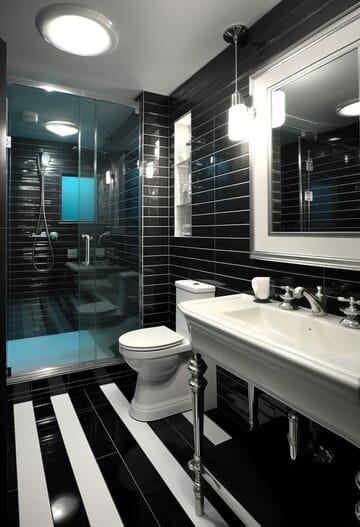Deep cleaning bathroom service is essential for maintaining a spotless and hygienic space. Hard water stains and limescale buildup can make even the cleanest bathrooms appear dull and unkempt. These stubborn deposits result from minerals such as calcium and magnesium, which accumulate on faucets, shower doors, tiles, and toilets. If left untreated, they not only ruin the appearance of surfaces but also cause long-term damage.
This detailed breakdown explains the most effective methods for eliminating hard water stains and limescale while preventing them from returning. Whether tackling small-scale stains or deep-rooted mineral buildup, proper techniques ensure a sparkling clean bathroom.
What is Hard Water Stains and Limescale?
Hard water stains and limescale are common problems in bathrooms due to high mineral content in water. These deposits typically appear as white, chalky, or cloudy residue on surfaces exposed to water, such as glass shower doors, sinks, and tiles.
What Causes Hard Water Stains and Limescale?
- Mineral Deposits: When water evaporates, minerals like calcium and magnesium are left behind, forming stains.
- Soap Scum Interaction: Hard water minerals react with soap, leaving a filmy layer that is tough to remove.
- Water Spots on Glass: Repeated exposure to hard water causes cloudy streaks on mirrors and shower doors.
Where Does Limescale Form?
- Showerheads and Faucets: Blockages reduce water flow and efficiency.
- Toilets: Stubborn rings develop below the waterline.
- Tiles and Grout: Buildup makes surfaces appear dull and dirty.
Understanding the source of hard water stains helps in selecting the right cleaning methods for removal and prevention.
Natural Methods to Remove Hard Water Stains
Harsh chemicals are not always necessary for tackling hard water stains. Natural solutions effectively break down mineral deposits while being safe for surfaces and the environment.
White Vinegar Solution
- How It Works: Acetic acid in vinegar dissolves mineral deposits.
- Application:
- Heat vinegar slightly to enhance effectiveness.
- Soak a cloth in warm vinegar and place it over stains for 10–15 minutes.
- Scrub gently with a sponge or brush.
Baking Soda Paste
- How It Works: Acts as a mild abrasive to lift stains.
- Application:
- Mix baking soda with water to form a paste.
- Apply to stained areas and let sit for 15 minutes.
- Scrub and rinse thoroughly.
Lemon Juice and Salt
- How It Works: The citric acid in lemon breaks down mineral deposits.
- Application:
- Sprinkle salt over stains.
- Rub with a halved lemon, letting the juice dissolve buildup.
- Rinse with warm water.
These natural methods provide a cost-effective, non-toxic way to clean hard water stains and limescale.
Chemical Solutions for Stubborn Stains
For heavy buildup, specialized cleaning products target mineral deposits without damaging surfaces.
Commercial Descalers
- How It Works: Formulated with acids like hydrochloric or sulfamic acid to break down deposits.
- Application: Follow product instructions, ensuring proper ventilation.
Hydrogen Peroxide and Cream of Tartar
- How It Works: A gentle bleaching agent that lifts stains.
- Application:
- Mix equal parts hydrogen peroxide and cream of tartar.
- Apply paste to stains and let sit for 30 minutes.
- Wipe clean with a damp cloth.
Toilet Bowl Cleaners for Limescale Rings
- How It Works: Acid-based formulas dissolve stubborn rings.
- Application: Apply under the rim and scrub after 10 minutes.
Chemical solutions provide effective results for difficult stains but should be used carefully to avoid surface damage.
Preventing Hard Water Stains and Limescale Buildup
Consistent maintenance keeps surfaces free from stains, reducing the need for deep cleaning.
Install a Water Softener
- How It Works: Reduces mineral content in water, preventing buildup.
Regular Surface Drying
- How It Works: Wiping surfaces after use prevents minerals from settling.
- Application: Use a microfiber cloth to dry shower doors and sinks.
Vinegar Rinse for Faucets and Showerheads
- How It Works: Dissolves mineral deposits before they accumulate.
- Application:
- Fill a bag with vinegar and secure it over the faucet.
- Leave overnight and rinse.
Protective Coatings for Glass and Tiles
- How It Works: Creates a barrier to prevent stains.
- Application: Apply a water-repellent spray to shower doors and tiles.
Implementing these preventive measures minimizes the recurrence of hard water stains and limescale.
Why Choose Shine Bright Maids?
Shine Bright Maids specializes in deep cleaning bathroom service, ensuring hard water stains and limescale are completely removed. Professional cleaning solutions restore surfaces to their original shine while implementing preventive measures to keep bathrooms spotless for longer.
- Eco-Friendly Cleaning Solutions: Safe yet powerful products effectively eliminate stains.
- Attention to Detail: No stain is overlooked, leaving every surface immaculate.
- Experienced Team: Trained professionals use the best techniques for lasting results.
By choosing Shine Bright Maids, hard water stains and limescale are no longer a challenge. Surfaces remain fresh, clean, and free from buildup, ensuring a pristine bathroom environment.
